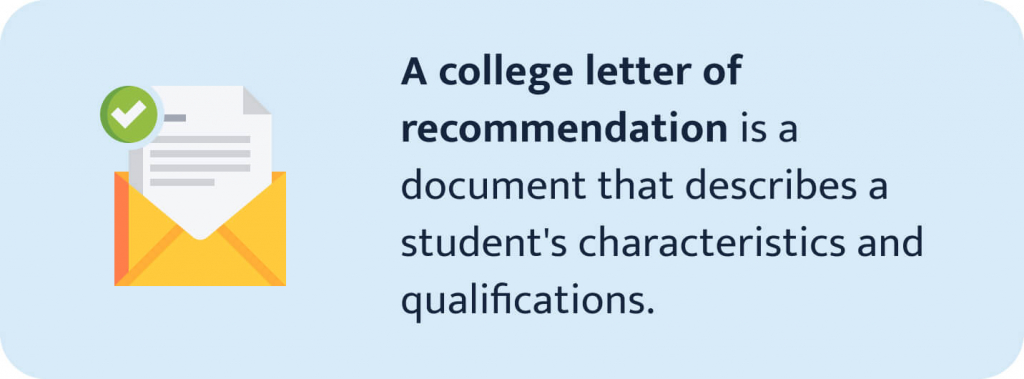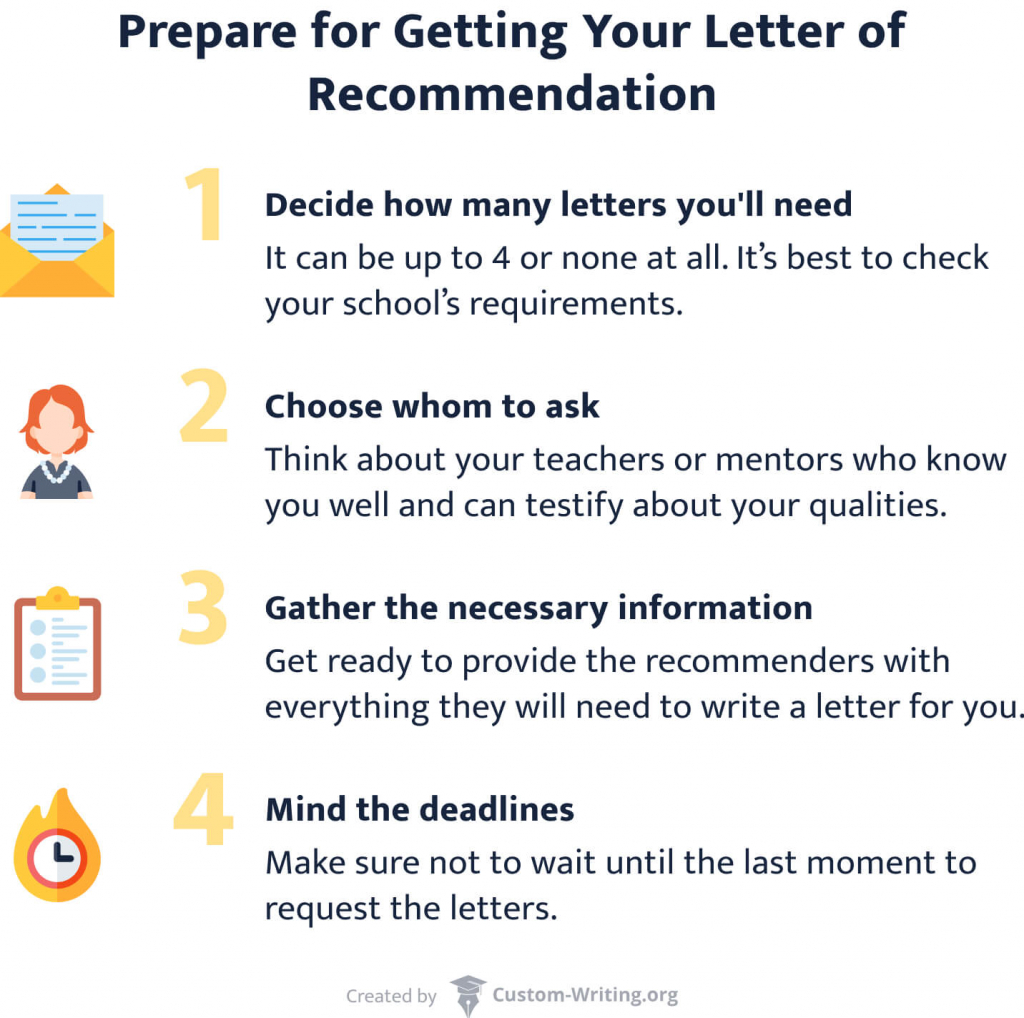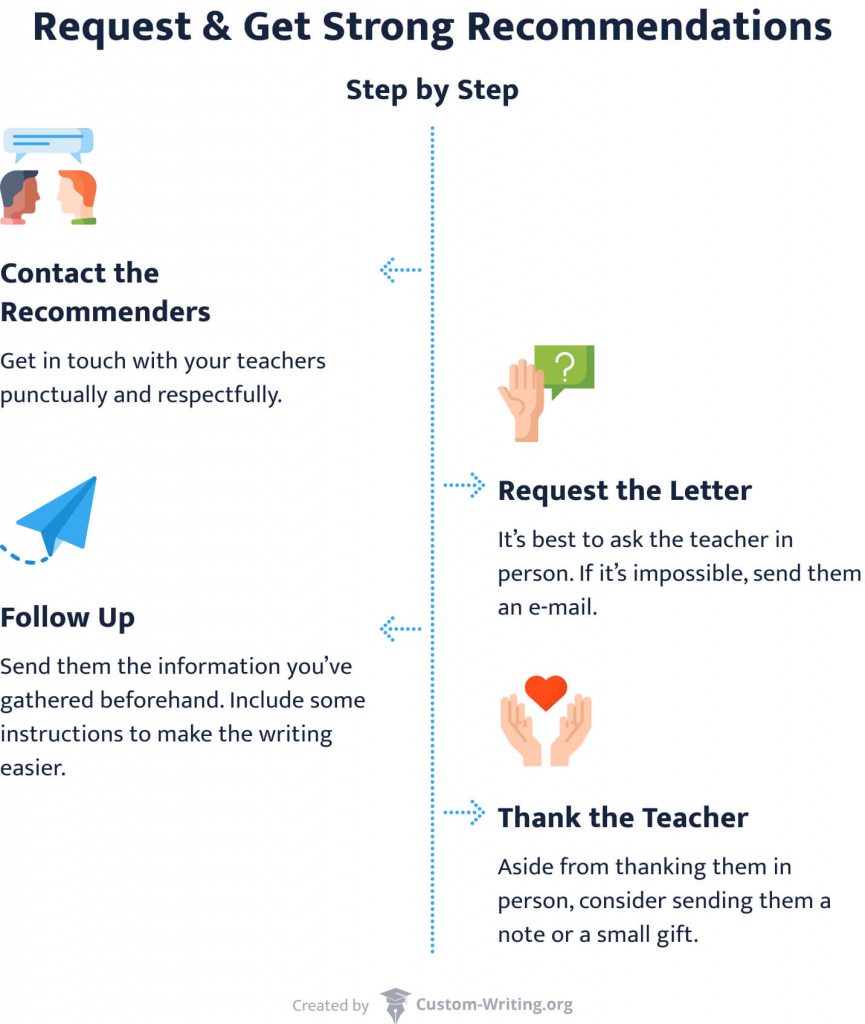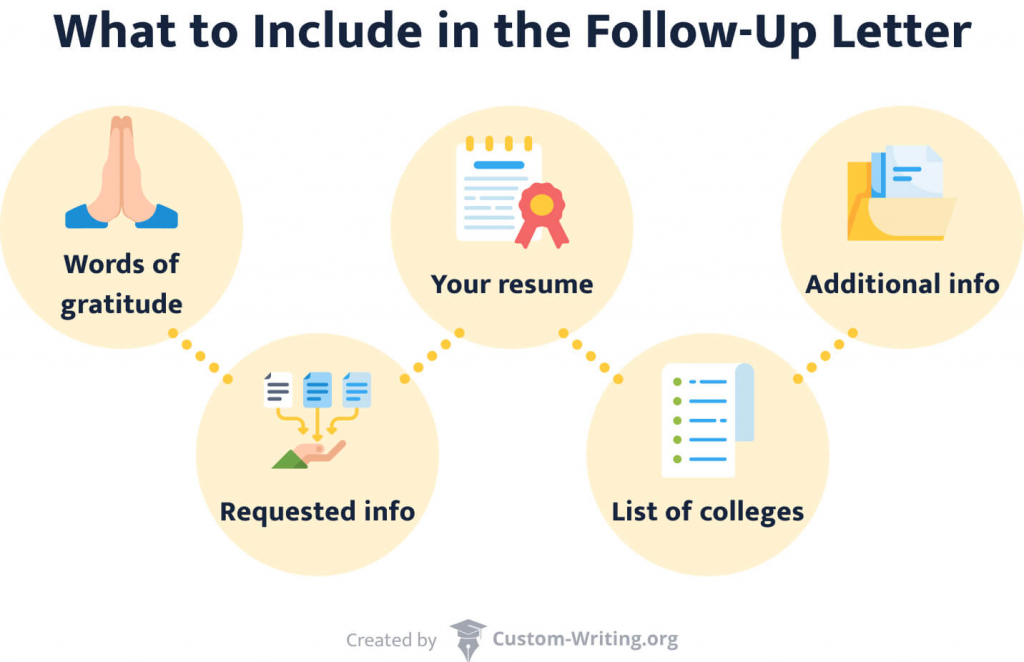Do you dream of being successfully admitted to college?
Well, you probably know that admission is a complicated process that comprises numerous challenging steps. One of them is a recommendation letter: a document written on your behalf that highlights your characteristics as a student. If done well, such a letter may drastically boost your likelihood of getting into your ideal college.

If you’re unsure how to handle this step, our custom-writing team is here to help you. In this article, we’ll clarify how to ask for a letter of recommendation for college and get a terrific one that will surely enhance your application.
☝️ How Important Are Letters of Recommendation?
First, you work to build your reputation, and then your reputation works for you. Often, we only understand this rule when it’s already too late. But, as a soon-to-be student, you should take it seriously.
Here’s why.
Some colleges regard recommendation letters as more significant than any other information. When the competition is fierce, grades aren’t always the critical factor. If this is the case, glowing letters of recommendation are a must.
Here are a couple of things that recommendations can do for you:
- Demonstrate that you’ve done a great job impressing your teachers. The fact that they’re willing to praise you in a letter will speak volumes about your trustworthiness and diligence.
- Express things about yourself that wouldn’t otherwise be obvious to the admission board. Your test scores don’t say much about your personality, do they? That’s where letters of recommendation will come in handy to underscore your qualities and skills.
Now, who can assist you with these letters? Teachers are probably the first people who come to mind. Yet, you can also turn to your mentors, employers, clients, coaches, or other people who know of your academic or professional capacities well enough.
📩 Getting Perfect Recommendation Letters in 8 Steps
How to Prepare for Your Letter of Recommendation
Receiving the letter itself is the result of a well-thought-out plan. Let’s see what it takes to get that result worry-free.

1. Decide How Many Letters You’ll Need
The quantity of recommendation letters needed depends on the colleges you apply to. Different schools may have drastically varying requirements, so it’s imperative to review their instructions before talking to the people who will write your letters. Following instructions is the first step of a successful application process.
Here is what the requirements usually look like:
- Some colleges ask for 0 recommendation letters. For some students, this may be good news. For others, it could feel like a missed opportunity. Why not contact the admissions office and ask if they would read your letter if you send one? Some will agree to read it, and others might tell you not to bother.
- Sometimes a school doesn’t want any letters of recommendation but requires one from a counselor. Again, if you feel like sending a teacher’s letter is imperative, we advise you to check the college’s website or ask the admission officers whether they’re willing to read your recommendations.
- Most schools require 1 or 2 letters, which is probably the best option for a student—not too many, not too few.
- Military schools take it to the next level by asking students to submit 3 or 4 letters.
Now, what about extra letters? This is usually a case of “more is not always better.” Make sure the school you’re applying to will accept an additional letter of recommendation. If they clearly state they do not want any extra documents, then by all means, only send what’s required.
2. Choose Whom to Ask
Now that you’ve established the number of letters you need, it’s time to choose the people you’d like to ask. We suggest first checking the requirements of each college since they may want to hear from specific people in your life.
Try to choose people who:
- Know you well and have had a chance to observe you in different situations. They will be able to explain how versatile you are and describe your character.
- Teach core subjects or the ones you’re going to study at college. They will be able to paint a better picture of your academic achievements in the sphere of your interest.
- Remember who you are, that is, taught you in the last year or two. It ensures that they will describe the person you are now, not the elementary school version of you.
In case you haven’t formed a close relationship with any teacher, early preparation is crucial. If you started thinking about your application in advance, there’s a good chance you’ll be able to make friends with some of them before asking for letters of recommendation. Make sure they know about your best character traits, skills, and interests that demonstrate the kind of person you are.
- Pro tip: If you still have a couple of years before college, or even just one, always remember about the importance of your reputation. The better it is, the higher the chances you will get wonderful letters from your mentors.
3. Gather Necessary Information
There’s one more thing we should all remember: people appreciate when others value their time. You wouldn’t want someone asking you to do a ton of work with two days left until the deadline, would you?
Your teacher may have to write several letters of recommendation, do their usual work, and live their everyday life too. They will thank you if you approach them with all the necessary information when there’s still plenty of time before the admission deadline.
The information needed for the letter may include:
- An overview of your academic achievements.
Have you won a contest, been exceptionally good at a sport, or never missed a class? Remember to mention your impressive achievements! - Your future college and career goals.
Outlining your aspirations may be beneficial, even if you haven’t seriously thought about it yet. - Your professional resume.
Recall any summer work you’ve done. Write about the responsibilities you took on and qualities you cultivated. - A list of colleges along with their requirements.
You don’t want your teacher to have to look up this information in their free time. - Practical information: word limits, deadlines, and submission tips.
There are different ways to submit letters of recommendation. Your teacher needs to know which one is preferable for each college. - Important projects or activities you participated in.
Have you done any volunteering or worked on the school newspaper? Add this info as well. - Any aspects of your character you wish to showcase.
It’s okay to praise yourself, but if it’s difficult for you, ask your parents and friends. We recommend that you also put in personal anecdotes to prove whatever you’re describing.
4. Mind the Deadlines
As you probably know, there are 3 main application deadlines: early action, early decision, and regular. Once you’ve made up your mind, it’s time to think about your letters of recommendation. It may be worth to tackle them first and then move on to other application parts.
Asking for a recommendation at the end of your junior year is a win-win situation for both you and your teacher. You can forget about the letters for a while and concentrate on the other aspects of the application process. Meanwhile, your educator will have enough time to write the letter without any rush.
How long does it take to compose a letter of recommendation? Well, it isn’t something you can do in an hour. It takes time, planning, consideration, and careful wording. The absolute minimum you should give your teacher is a month.
- Pro tip: Don’t panic if you have to establish a good relationship with the educator first. Even if you don’t have much time left, you can still succeed if you do things correctly.
How to Request and Get Strong Recommendations
Now that we’ve laid the groundwork, it’s time to move on to the next step. Your success largely depends on how you request the recommendations. Let’s see how to do it best.

5. Contact the Recommenders
Naturally, the first step you want to take is to get in touch with the teachers you’ve chosen to represent you. Here’s how to do it well:
📌 Do it early. As you already know, you should always give your teacher enough time to complete whatever favor you’re asking of them.
📌 Do it respectfully. Don’t run to your mentor during a break for a 5-second conversation. Also, avoid approaching them with a crowd of friends who also want this person to write their letters of recommendation. Bombarding someone with the same request in a large group is a sure way to annoy them.
📌 Do whatever depends on you. Some colleges require printed copies of recommendations to be mailed to them. If that’s the case, ensure you provide the person writing recs for you with envelopes, stamps, and everything else they might need.
📌 Do what’s requested of you. Your recommender may require you to send them some personal information before they can sit down to write the letter. It should be your top priority to provide it without delay.
📌 Do what’s right. Genuinely expressing your gratitude is the best thing you can do. Write a thank-you note or come up to the teacher and present them with a heartwarming gift.
6. Request the Letter Properly
Requesting the letters is not easy and can be terrifying. We will share with you some excellent tips that will surely make it more manageable.
Naturally, your teachers have your best interests at heart, but technically speaking, writing a letter isn’t something they’re obliged to do. Don’t take their help for granted and try your best to do your part well.
Now, what’s the best way to take the initial step and bring up the question for the first time?
Ask them in person, of course! It is by far the politest way to ask someone to do you a favor. If that’s impossible, you can email the person you’ve chosen to ask, but consider talking to them first.
Here’s a sample of how you can begin your letter or conversation:
Example:
Hello, Mr.X!
This is Sophie M. I was wondering if you could write me a letter of recommendation for college. I deeply respect you as a teacher and feel we have established a great connection. You know my strengths and personality well. I feel like you could help me boost my application with a nice recommendation! Do you think it would be possible?
7. Follow Up on the Letters of Recommendation
You cannot expect your teachers to remember everything all the time, so it’s wise to remind them about the letter after a while. Once the person has agreed to help, you can tell them that you’ll send them all the details in a couple of weeks.
Don’t forget to include the necessary information we’ve mentioned. Apart from the personal information, your teachers will appreciate if you include instructions and samples of recommendation letters, especially if that person has never written one before.
Consider sending them links to the following helpful resources:
- Sample Letter of Recommendation | The City University of New York—an example of a strong recommendation with an explanation of what makes it good.
- Recommendation Letter Template | University of Washington Bothel—a sample framework you can use as inspiration.
- How to Write a Positive Letter of Recommendation | The Balance Careers—plenty of tips with bonus samples.
- How to Write a Recommendation Letter for Your Student | Intake Education—guide for writing each letter part, tips, and a sample.

Here’s a brief plan for a solid follow-up letter:
- Start by thanking the writer again.
- Include whatever information they requested.
- Attach your resume.
- List the colleges that interest you.
- Include anything else you find necessary.
And here’s how you can start your letter:
Example:
Dear Mr.X,
This is Sophie M. I’d like to thank you once again for agreeing to write my letter of recommendation! Your help is priceless.
I’ve attached all the necessary docs and lists to this email. If you have any other questions, please, don’t hesitate to contact me!
8. Thank Your Teachers for Their Letters
How can you choose the best way to express your gratitude? Well, it depends mainly on your recommenders, but here are some options to consider:
- Writing a heartfelt thank-you note is the safest option. Your teacher will be able to cherish it forever. It’s a great way to ensure they keep fond memories of you.
- Even if you’ve already sent them a note, you should also thank them in person. In fact, you could bring them the note yourself and thank them while giving it to them.
- In addition to a note, you could try to find a thoughtful present for your recommender. Remember if they shared something personal about themselves. Maybe they’re a fan of a sports team or a music band. Perhaps they mentioned they were looking for a special edition of their favorite book. Try getting something like that, or even a simple gift card.
✨ Bonus College Recommendation Letter Tips
Now, you know all about requesting glowing recommendations. You’re almost ready to get one yourself!
But before you go, we’d like to share more awesome tips with you to ensure that you get the letter of recommendation and the process goes as smoothly as possible:
✅ Consider completing a questionnaire.
Some schools publish custom forms for students to fill out. These can be super helpful for your teacher. Some may even have their own questionnaires, which you can send in with the follow-up letter we’ve mentioned.
✅ Don’t despair if a teacher says “no.”
Unfortunately, your chosen teacher may not have enough time to write your letter. They might already have to work on many recommendations or simply be exhausted from their work.
Whatever the reason, if you tell yourself in advance that a “no” is a possibility, it will be easier to accept. Stay polite, thank them for their time, and start looking for another person to recommend you.
✅ Ensure the information is up-to-date.
Your achievements at the age of 7 will certainly put a smile on anyone’s face. However, we recommend writing about more recent events to paint a better picture of the student you have become.
✅ Waive your FERPA rights.
FERPA stands for Family Educational Rights and Privacy Act. It protects the confidentiality of your education records and allows you to review and amend them. Waiving these rights means you will not have the opportunity to read and modify the letter before it is submitted to the college of your choice. Such letters are regarded as more trustworthy.
✅ Double-check that your letter is submitted.
It’s okay to ask your teacher whether they have sent the letter to ensure everything is going according to your plan. However, if you feel uncomfortable doing so, you can always inquire in the admissions office.
✅ Submit a letter even if it’s “optional.”
It’s worth to do every optional thing when it comes to college applications (unless it is explicitly stated that letters are not wanted).
✅ Avoid directly copying samples and templates.
You can use them for inspiration and show them to your teacher as an example. Still, a personal touch is crucial for a solid recommendation.
✅ Ask what your teacher will likely write.
Will they be able to write a detailed letter showcasing your best qualities? Do they have enough time and experience in writing recommendations?
Of course, you can’t ask them whether the letter will be good or mediocre, but you may inquire about what information they usually include. This will give you some ideas about what to expect.
With this ultimate guide on how to ask for college recommendation letters, you’re bound to succeed! Remember to follow all the steps, and don’t forget to tell us which ones helped you the most in the comment section below.
Good luck with your admission process!
🔍 References
- How to Write a Letter of Recommendation (Template + Tips): Coursera
- Frequently Asked Questions: Letters of Recommendation: Graduate School of Arts & Science: New York University
- Letters of Recommendation: Stanford Graduate School of Business: Stanford University
- Tips for Writing Strong Letters of Recommendation: College of Medicine: University of Central Florida
- How to Write a Letter of Recommendation: Grammarly
- Tips to Request and Write a Letter of Recommendation: Indeed
- How to Ask for a Letter of Recommendation for College: Glassdoor
- 4 Steps to a Great College Recommendation Letter: Ohio Wesleyan University
- Who Should I Ask to Write My College Recommendation Letters?: Collegexpress
- Asking for a Letter of Recommendation for College: 4 Steps to Success: Azura Pacific University
- How to Ask Faculty for Letters of Recommendation?: Agnes Scott College
- Requesting a Letter of Recommendation: Union College

![How to Search the Web Effectively [For Students]](https://custom-writing.org/blog/wp-content/uploads/2022/08/hand-touching-with-search-icon-search-engine-optimisation-seo-concept-find-information-by-internet-connection-1-284x153.jpg)
![Top 25 Gadgets You Need to Study Smarter [from $20]](https://custom-writing.org/blog/wp-content/uploads/2022/06/sad-female-workaholic-keeps-hands-chin-busy-making-project-work-studies-papers-wears-elegant-white-shirt-sits-desktop-unknown-people-stretch-hands-with-notes-alarm-clock-smartphone-1-284x153.jpg)








